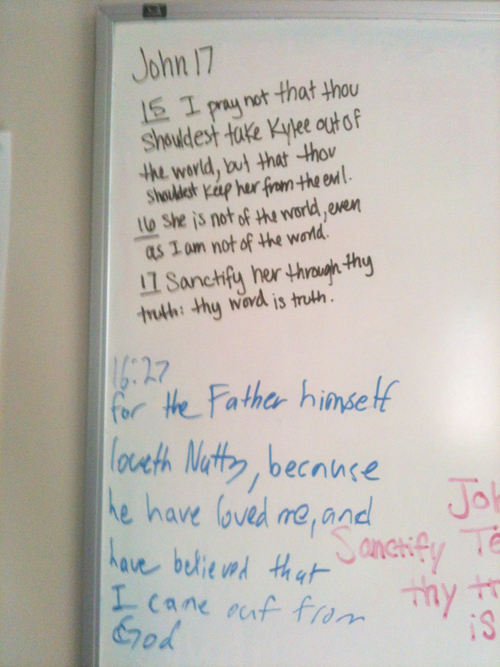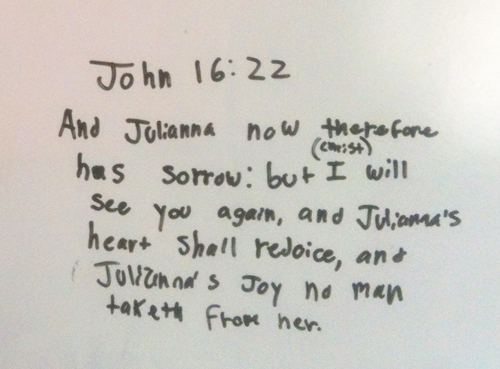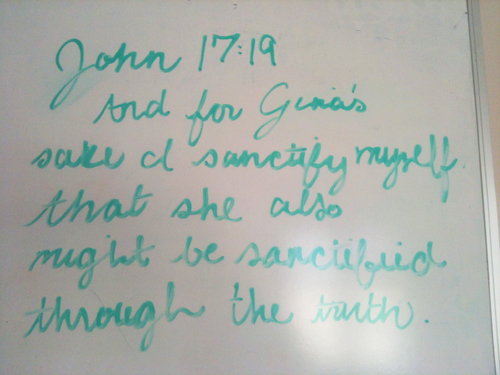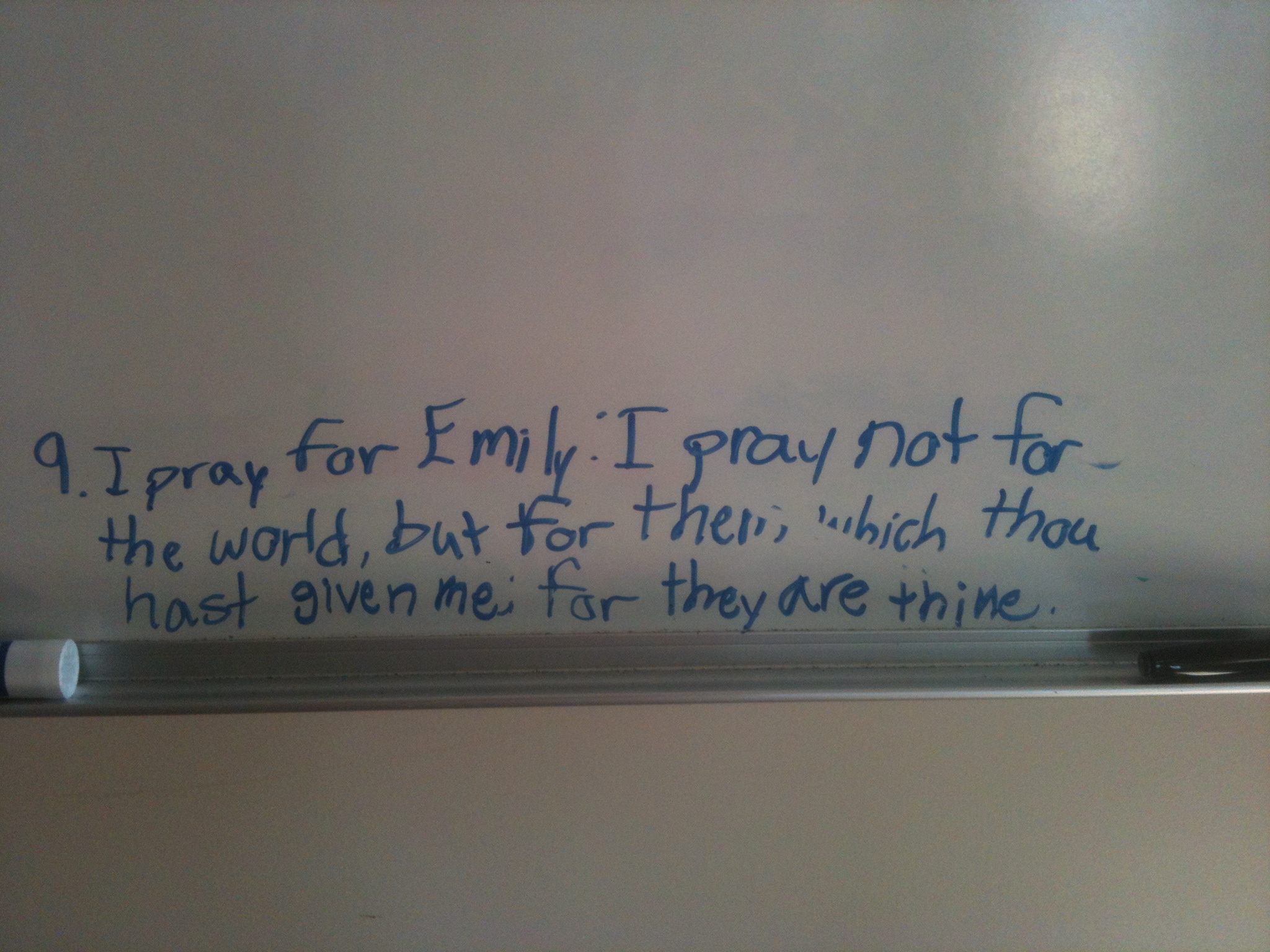You know, it feels like I’m better caught up on the blog than I really am…. I didn’t realize I was so far behind.
Anyway, we are wrapping up with John this week. My class takes off all but one day during the week of mid-terms/finals so that students can rest well and do their very best on their tests. A lot of classes in the area don’t do this, but I feel it’s important for me as a Seminary teacher to expressly support students in their secular classwork. I make it clear that they are not getting a holiday from Seminary because I need a break or because Seminary is difficult, but because I expect them to do well on their exams so they can get better grades that can open doors to future educational opportunities or other experiences. This year the school schedule is especially bad, and I have students who have two exams on each of the four days of exam week. Monday was a US holiday. My home-schooled class president is in a driver’s education course that interferes with her ability to meet many days as well, so I am actually holding two Seminary classes this week. One was Monday evening (we called it a Seminary FHE), and the other is Wednesday afternoon. Both of those days will be the same lesson. I gave it Monday to seven students and some parents and siblings plus my own kids, and I expect to have another 5-6 today.
I don’t have any lessons to report on from John 9-12 because I was out of town on those days. A friend of mine is adopting a child in Maine, and she needed some help since her family wasn’t able to go up. Maine is one of the last few states I’ve never visited, though I was literally outside all of a minute and a half — walking between the airport and taxi and hospital and taxi. The hotel I stayed at was attached to the hotel. Jared took the class for the week, so my lesson review/analysis starts withTHE “Free Day” lesson I taught before continuing with John 13.
Free Day – Note Taking/Scripture Marking
I have noticed a couple of students in my class marking their scriptures and taking notes on their electronic devices during class. I very rarely ask students to mark something, thought I do often say “you may want to underline this” or “you may want to write this cross-reference in the margins”. I wanted to take some time on this free day to give these students a chance to shine and to share why and how they are taking notes on lessons and what/why they mark their scriptures.
Now, most, if not all, the Seminary kids have seen my scriptures on occassion when they’ve forgotten theirs or didn’t grab them and we stayed at the couches or whatever. The reaction is always the same when they open then — eyes BUGGED OUT. It always makes me smile a bit, and I can tell that it makes them start thinking about thier own scripture marking. I don’t mean to sound arrogant, but in the area of scripture marking at least, I can honestly say I’m a good example. All of my kids mark during certain exercises, but with this lesson, I wanted to encourage them to customize their scriptures for themselves by seeing what others are doing.
I messaged three students on Facebook to tell them what I was planning. I told them that no one would read their private notes, but that it would be nice if they could think of some examples to share or things to show the class. I opened with a story about myself. When I started Seminary, I was one of two students. The other student was a Senior that I worshipped. She was that Super Cool Righteous Girl that we all want to be when we grow up. Our teacher would ask us to mark scriptures, and my friend never would. She said she believed that the scriptures were sacred and that marking them was a defilement. That sounded good to me, so I stopped marking my scriptures, too.
As I progressed in Seminary, I came to understand that the sacred nature of the scriptures is not the paper their printed on, but the Spirit that you feel when you read them. I also came to see that marking scriptures helped me find important things quickly and remember the feelings I had when I read them before. By my fourth year (D&C) I was a crazy scripture marker. Later at BYU, I took a course from Robert J. Matthews — who I love — and he told us that he marked all the books he read, because then the books became “his”. I really admired Brother Matthews — he’s one of the greatest gospel scholars I’ve ever heard, and I have tried to take his advice to heart by marking my books diligently.
After the story, I had the three girls come up to the front of the class where I read them in a panel of experts type discussion on what they mark when they are in class. One girl copies everything I write on the board in her class notebook. She mentioned that last year she hadn’t done that, and wished she had because she could see that by looking over her first year of Seminary notes that there are answers there for questions she has now, but forgot about. Another summarizes what we learn in class in her electronic scriptures. She uses her electronic scriptures to cross-reference passages quickly. The third marks her paper scriptures with passages that stick out to her and writes notes in the margins. Here are the questions I prepared:
- What kinds of things are you nothing in your scriptures? When?
- How do you decide what to mark?
- How does marking in this way help you?
- Each of you seems to be marking different things even from the same lesson. Is there a right or wrong way to mark scriptures? Why?
- Does scripture marking or note taking require a lot of work?
These girls did a ridiculously good job. Seriously amazing. I didn’t have to ask all the questions because they answered them so well. Each had an experience or more where marking their scriptures had helped them. It was great! The exercise went about 15 minutes longer than I expected it to because the girls were so passionate about their scripture marking. I had planned to do zoned scripture mastery, but instead we used the shock ball to learn Acts 7:56–57.
John 13
For John 13, I wanted to make two points:
- Disciples are recognized by their love for each other
- Leadership is not about who is in “charge”.
To begin the lesson I gave a little background. I told the kids that before I started taking questions I’d explain a couple of the awkward-sounding things in the chapter.

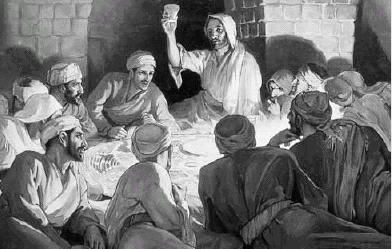
It’s the Feast of the Passover. At this time, people reclined on left arm and ate with right. I showed them the picture of the apostles from the manual and pointed out John. It’s not as awkward as it sounds. You can imagine John leaning back and looking up at the Savior while Peter, probably across the table, gestures at him. In the center of the table was a bowl with broth and meat. People would use the bread to “sop” up some broth to eat. The bread may have been shaped like a spoon, and sharing the sop was considered a great act of honor. After the meal, Peter says he won’t deny Christ and would lay down his life for the Savior.
The general reaction to this information was relief. Most of them had been very confused by some of the phrasing during their reading the night before and were able to understand what was happening. I have to say that I think it helps my credibility as a teacher when they read something and then I can help them understand what it really means. It’s another advantage of having them all read the material beforehand — it makes me look even smarter! :)
I have a resin statue of Jesus washing a disciple’s feet that looks like the one below. It’s really beautiful in real life.
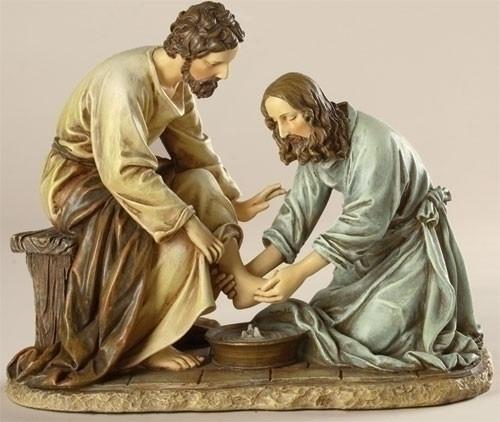
I also passed this around while we read the following scripture passages:
- Luke 22:24–27 – this shows the argument that was happening at dinner before Jesus washed the feet of the disciples
- Mosiah 2:18–19
- John 13:1,3–5, JST of 8-10, 34-35, 14-15
After reading these passages I asked, “What do you think Jesus was trying to teach his disciples by this act?” and “How is serving a mark of leadership?”
“Think of a time when someone you admire performed an act of service for you. How was that person acting like the Savior?” (This turned out to be a question that resulted in blank stares although it looked good on paper. I will find a better question if I ever teach this again.)
“Why is loving others a sign of discipleship?”
Then I had a student read the story from the manual below even though it’s long:
“Some time ago a friend of mine related an experience that I should like to pass on to you. He said:
“‘My father’s cousin and my father lived in the same community and were competing in the construction business. There grew up over the years a very keen and bitter rivalry between them. This was triggered in the beginning in the bidding of construction contracts, and later in our city political affairs where they opposed each other in very spirited elections.
“‘Our immediate families inherited this situation upon the death of my father, for we boys seemed to take over where Dad left off. It was quite a strain on the members of his family and ours even to be civil to one another, even in our Church callings where he served as bishop of one ward and I in another, and later in the high council where we were both members. When we came together it seemed that Satan took over, and I am sure he did, for haven’t we been told that where contention is, the Spirit of the Lord is not?
“‘This situation continued to fester. Suddenly I found myself with a call to put aside all worldly things and go to preside over a mission. This was a thrilling experience to contemplate, and yet I subconsciously had a most uneasy feeling about it. I kept asking myself: “Are you really worthy to accept such an important call?” I was living the Word of Wisdom, I was a full tithe payer, I was faithful in all my Church activities, I was morally clean, and yet this uneasy feeling persisted.
“‘I set about immediately to get my business and personal affairs in a condition where others could handle them while we were gone. While returning home from my office one afternoon, it really happened. I didn’t hear a voice, but just as clearly as if a voice spoke to me something said: “You must go to your father’s cousin and get things straightened out. You cannot go on this mission and teach the gospel of love when this terrible feeling exists between you.”
“‘I drove to his home, and with great fear and trepidation went up and rang the doorbell. There was no answer. After waiting a few minutes I went back to my car and said silently, “Lord, I made the attempt. I am sure this will be acceptable.” But it wasn’t. This uneasy feeling still persisted. I prayed earnestly about it.
“‘The next day as I sat in a funeral service, my cousin came in and sat across the aisle from me. The Spirit moved me to ask him if I could see him at his home after the service. He agreed. This time I went with calmness and tranquility in my soul because I had asked the Lord to prepare the way for me.
“‘When I rang the doorbell he invited me into the living room and congratulated me on my mission call. We talked a few minutes about things in general, and then it happened. I looked at him with the feeling of love, which replaced all the old bitterness, and said: “I have come to ask forgiveness for anything I have ever said or done that has tended to divide us and our families.”
“‘At this point tears came into our eyes, and for a few minutes neither of us could say a word. This was one time when silence was more powerful than words. In a few minutes he said: “I wish I had come to you first.” I replied: “The important thing is that it is done, not who initiated it.”
“‘At this moment we had a rich spiritual experience, which caused us to purge our lives and our souls of those things which had separated us, which has resulted in our having proper family relationships.
“‘Now I could go on my mission and teach the true meaning of love, because for the first time in my life I had experienced its deepest dimension, and now I could honestly say that there wasn’t a person in the world that I didn’t love and appreciate. Since that day my live has never been the same, for it was then that I learned in a most positive way as I had never understood before the injunction of the Master to his disciples when he said: “A new commandment I give unto you, That ye love one another.”’ (John 13:34.)” (N. Eldon Tanner in CR, Apr. 1967, pp. 105–6, as quoted in The Life and Teachings of Jesus and His Apostles, (1979), 158–63)
I asked the class to ask themselves if they had someone in their lives they were having hard feelings about that they could patch things up with. <– wow. That is a really bad sentence. Hope you can understand it. I encouraged them to listen to the Holy Ghost when it talks to them and act on any promptings they recieve. We wrapped up with verse 17.
John 14
This lesson was a difficult one. The material was good, but I had a hard time trying to figure out how to cover it exactly. In the end I decided to broke the lesson into two sections. One is the easier “find words of comfort” that I was confident all the students in my class could hear and the other was to discuss the Second Comforter in some depth. I didn’t expect many to really grasp what was going on with the Second Comforter, and told the class it was okay if much of it went over their heads. I was hoping four of my students might get it. As it turned out, I think only one really understood — she grabbed me afterward to thank me for the lesson.
At the top of the board I wrote comfort with some verse numbers under it and instructions noted below, and at the top of the other I wrote Comforter.
For our first activity I had students mark in their scriptures the words of comfort found in chapter 14. They could use a colored pencil of a different color than the usual one they use if they wanted. We shared what they marked. We then turned to verse 16 and the JST to lear about the two comforters mentioned in this passage. I gave them a handout on the Two Comforters and let them read and mark it quietly. I was well prepared and hopeful that one or two might be able to discuss this in a little depth. We ran out of time and didn’t get to it, which was fine for them but disappointing for me. Oh well. Most of them couldn’t really handle it anyway.
John 15
This was a pretty good lesson, but I knew it would be short, and I didn’t want to stretch it into the fluff zone. I decided I’d just let the kids out early whenever we were finished with our discussion.
On the board I drew a (terrible) picture of a vine with roots. I also drew a picture of a long-stem rose bud and a branch with flowers on it. I explained to the class that this chapter contains some of the very last advice that Jesus gave to his disciples before he died. He’s calling himself the True Vine. Why would he choose this symbol? We spent 10-15 minutes talking about the symbolism of the vine. If Christ is the vine, who is the branches? Who are the roots? How is vine:branch like Savior:us?
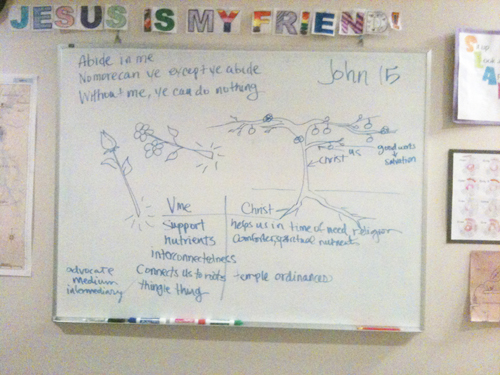
We decided that vines provide nourishment, they support the branch so they can grow and spread, they connect the branches to each other, and connect the branches to the roots. The Savior connects us to each other and to our families through temple ordinances. A rose can still bloom after it’s cut off it’s vine, but a fruit branch, when cut off from the tree can no longer produce fruit — it requires nourishment. How is that like our relationship with the Savior? What nourishment does the Savior provide us? What support?
One of my students, moms is a Master Gardnener and she gave me some blackberry starts last year. She also gave me some instructions on how to prune the vine. The farmer she gets her fruit from can get blackberries as big as eggs (yes, really) because he prunes his blackberry bushes. What is pruning in the gospel sense? How can it help us grow bigger fruit?
It was a good discussion, but as I expected, it ended early. I went ahead and let class out 8 minutes early. I told the kids they could leave early, work on scripture mastery, or talk about the Second Comforter with me (hope springs eternal). A few left early, but most worked on scripture mastery. Probably 10 passages got passed off. Funnily, the students are always so surprised when I let them out early, that they nearly all STAY LONGER and work on scripture mastery. Seriously. If we do it during “class time” it’s work and no fun, but if they stay after — they are like scripture memorizing machines.
John 16-17
I started the introduction to this lesson after the John 15 lesson by telling the class that Elder Hales has said that if he were only select one page of scriptures, he would choose the page that contains the last few verses of John 16 and chapter 17. (I hunted and hunted for this reference but couldn’t find it. If you have it, please post below!) It also happens to contain my favorite scripture verse, so I told the kids to see if they could guess what it was from their reading.
I decided to do the court analogy role play from the lesson, but I didn’t like the way the advocate was described in the manual. I don’t see Jesus as making excuses for our behavior, but acknowledging it and offering to suffer for us anyway.
Before class, I wrote on four notecards the roles for the actors:
- judge – swears in the witness, tells the courtroom that perfect justice will be served, accepts the offer of the advocate, finds the defendant guilty
- intermediary/defense/advocate – after hearing the accusations and confessions, this person acknowledges the guilt of the accused, but offers to suffer his/her punishment so that this person can live with his or her family and try again to obey the law
- prosecutor – asks aggressive questions about sins committed
- defendant – answers questions from the prosecutor. These answers don’t have to be true of you, but they should be generally true. Graciously accept the offer of the advocate to take your punishment.
I sent four student “voluntolds” to the back bedroom to work on their skit. I have to say, they did a much better job than usual. I’m not really sure why, because sometimes that particular bunch is not always the most organized. While the “voluntolds” were working on the skit, I had the others look back over John 16 and 17 to see if they could guess my favorite scripture. I don’t usually do that “guess what I’m thinking” because I think that it puts me in a position where my ideas are the most important in the class. But I admit, I just couldn’t come up with a little activity they could do while the others were working, so that’s what we did.
Anyway, when the group came back I acted as baliff: “All rise for the honorable Judge Dread”. They picked out that name, and he found a nerf gun in the back he was carrying in his sweater. :) The kids followed the bones of the skit, and did a really great job, especially the judge and advocate. Aftewards we talked about who each of the pople in the skit represented. Judge — HF, Advocate — JC, Defendant — us. In the manual version the prosecutor is Satan, but I don’t think that’s doctinally sound. I taught it that the prosecutor is ourselves. We’ll be doing the condemning at the Judgement Bar. Luckily my kids already knew this doctrine so I didn’t have to teach it. I wasn’t prepared to do so anyway.
Next we talked about the intercessory prayer. I had a student read a quote from Elder Hales about this chapter:
I have a great love for the scriptures. I love reading about the mortal life of Jesus Christ. There is so much in His life that can lift and inspire and strengthen us in our times of need. To me, one of the most sacred chapters in all the scriptures is John chapter 17. The entire chapter is an intercessory prayer offered by Jesus Christ to His Father. He says, in effect, “If only the world could know you as I know you.” He tells His Father that He has done everything He has been asked to do.
Sometimes we forget how remarkably obedient the Savior was. Everything that He did, everything that He said was out of obedience to His Father. His seeking out and caring for the poor, the calling of His disciples, His teachings both in the land of Palestine and in the Americas—all these things were done because His Father had commanded Him to do them. He had no personal agenda. He said, “I do nothing of myself; but as my Father hath taught me” (John 8:28). What a perfect example of obedience!
In the choices we make in life, we need to know the Savior. His simple admonition “Come … follow me” (Matt. 19:21) could transform human existence if we would let it. He has the power to make our burdens light if we will turn to Him.
As an Apostle of the Lord Jesus Christ, I have the opportunity to bear testimony as a sacred witness of the Savior. My greatest desire is that my testimony might penetrate the hearts of those who hear it.
I know that Jesus Christ lives. I know that He guides and directs His Church by revelation through His prophet in this very day and time. If we will have faith in our Savior, He will see us through our trials and tribulations, and we will be able to endure to the end and return to His presence after this mortal probation. He lives and knows and loves each one of us. He so much wants to bless us if we will come unto Him. Of this I bear humble testimony and witness in the name of Jesus Christ, amen.
I taught the students the three parts of the prayer:
- vv 1-3 – offered himself as the great sacrifice. His hour had come.
- vv 4-19 – reverent report to the Father of his mortal mission.
- vv 20-26 – Jesus intercedes, not only for the eleven apostles present but for all who shall believe on Jesus “through their words” in order that all would come to a perfect unity.
I then explained to the students that I felt the most important thing they can take away from this prayer is that it’s for them. They were literally included in this prayer. Christ prayed for you and me. Our last activity was for students to take a verse or verses that spoke to them and substitute their own name in. I used verse 14 as an example: “”I have given Jenny my words; and the world hath hated her because she is not of the world, even as I am not of the world.”
When students found the verses they liked, they wrote them on the board. I think it was a pretty good exercise. My students that don’t read well didn’t seem to get it, and it took a lot of help to get them to understand how to substitute their names in. Finally I told them to choose a verse and I’d help them. One still had a difficult time, and another just wrote her verse number on the board. I’m sure there are those who have difficulty reading in every Seminary. It has such an effect on their ability to understand and relate to the material — any material, and it can really slow the class down. I do my best not to be frustrated, and I think I do a pretty good job. I was annoyed this day, but I doubt any of them knew it. It helped that I was teaching from behind the class, too, I expect! :)
John 17-21
As I explained above, I had to condense a week’s work of reading into one lesson this week because of exams. I still require students to do their reading during exams, but they only attend one class. It’s like home study Seminary one week per year. It’s a nice challenge.
Because of the volume of material, I couldn’t dig as deep into the verses of the passages as I usually do. Instead I took three questions and an activity and covered those. The material was so awesome that it worked out great.
First I had the class write questions for our upcoming review of the four Gospels next Tuesday.
I explained that I was going to answer three questions during class:
- How can we relate to the suffering of the Savior during his atonement?
- What can we learn about the Savior’s character from his last words upon the cross?
- What changed the apostles from fearful followers to courageous leaders after the Resurrection?
I passed out the handouts:
- The Significance of Gethsemane
- Seven Statements on the Cross – from the BYU Studies website, may require a paid subscription (seriously pay for this — the handouts are great and your subscription supports BYU Studies)
- Resurrection
I broke up the Gethsemane scripture into three parts. One very long and the others only 2 and 3 paragraphs. We read those together and discussed them. Went well.
The last comment was on abandonment and tied in perfectly with the Seven (recorded) Statements we have by the savior while he hung on the cross. I was running low on time, so I read these aloud and had students call out the first word that they thought of that described the Savior’s character in these verses. Went well, but a little rocky. It was improvised, so it was fine.
Next was the fun part. We read aloud almost the entire sheet on Resurrection. I asked the students what resurrected beings have. They are tangible. They can teleport, or something like it (moving in and out of closed rooms). They can eat! Then we read the bottom part of the handout. The kids’ minds were blown. The missionaries and mommies in the room were loving it, too. We had a great discussion about the resurrection and the hugeness of the atonement that makes it possible for us to live again in a new glorified body. This discussion was so great that finally after we were 10 minutes over I had to shut everyone down. They seriously loved this.
I love it when a lesson comes together!
Afterward, my son came to me with this dazzled look on his face. He said, “Mommy. I really liked Seminary tonight.” He starts Seminary next year. I asked him why. He said it was really cool that people could just call out their thoughts and others could say “yeah, me too” (he had done this, though not technically part of the class). He had felt the spirit and learned things that were new to him.
He reminded me of why we have Seminary: to give students a glimpse into eternity. When these kids start to see the beauty of the plan of salvation and their own place in it, it changes everything. They can see why their choices matter. They can see why they themselves matter. They know they are loved by the great Supreme Being. They can see that Jesus Christ was the Savior. He saved them, literally. They can be courageous and full of faith no matter what happens.
I have to say — this is the best calling ever. Brother Dingess was right — I really do like this. I hope they never relase me.
Now I’ll probably be released next week…..

